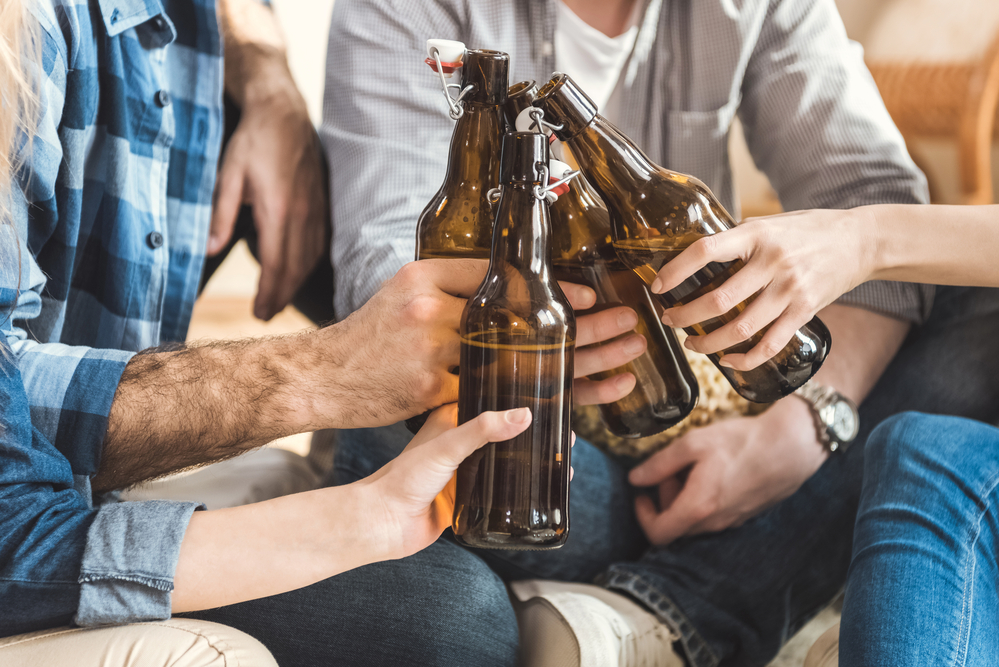It’s important to realize that alcohol addiction is not simple to quit. Using treatment to overcome alcohol abuse can make the process safer and easier.
Alcohol is one of the most commonly consumed substances around the world. Whether it be at social settings, an evening out for dinner, or while watching your favorite sports team, alcohol is present. Alcohol addiction can easily go unnoticed because of the consistency of its presence and the collective effects it has on you and those around you. Drinking in excess has become a common commodity.
However, if you find that you, a friend, or family member have been struggling with alcohol addiction it can be a painful
 experience. One of the most common symptoms of alcohol addiction is hiding the normality and frequency of consumption. Addictions can be embarrassing and humiliating to admit to. This can create an isolating experience for the person struggling.
experience. One of the most common symptoms of alcohol addiction is hiding the normality and frequency of consumption. Addictions can be embarrassing and humiliating to admit to. This can create an isolating experience for the person struggling.
If you are struggling with alcohol addiction, Transformations Treatment Center in Delray Beach FL is here to ensure that you are not alone in your cessation process. From detoxing to post-treatment counseling and care, we are here to support you and walk with you for the entirety of your treatment.
Struggling with alcohol addiction and the subsequent withdrawal symptoms can be a painful and terrifying experience. A rehab facility which offers professional supervision and the right medical care during your detoxification can be instrumental in helping you detox successfully. Detoxing is an important first step in your recovery.
After detoxing, you will need to begin a treatment program which assists you long-term. Depending on your needs this can be found in a rehab facility or an outpatient counseling program. Transformations Treatment Center’s programs for alcohol addiction do not only treat the physical addictions you are facing, but also seek to address any mental or emotional aspects of your addiction.
Each program we offer is completely tailored to your lifestyle, environment, and any co-occurring health disorders (mental health disorders along with addiction). This is to ensure that not only are you offered the best treatment for your dependence disorder, but are given a chance to be prepared for a lasting road to recovery.
Alcohol use disorder is a type of addiction which can require ongoing medical treatment. Our alcohol addiction rehab program uses a successful, research based medication-assisted treatment.
 MAT is the most common withdrawal treatment that Transformations uses in our withdrawal and addiction treatment programs. If you have dealt with withdrawal symptoms before due to alcohol, you will most likely deal with them again. The goal with MAT is to provide the necessary care to ensure our patients receive safe and regulated treatment that prevents the risk of potentially dangerous side effects.
MAT is the most common withdrawal treatment that Transformations uses in our withdrawal and addiction treatment programs. If you have dealt with withdrawal symptoms before due to alcohol, you will most likely deal with them again. The goal with MAT is to provide the necessary care to ensure our patients receive safe and regulated treatment that prevents the risk of potentially dangerous side effects.
There are several common medications used to help curb the side effects of
withdrawal symptoms from alcohol abuse:
We at Transformations Treatment Center, Delray Beach, FL understand that medication on its own is not enough for long-term recovery. Rehab must be paired with therapy. When dealing with addiction, behavioral therapies may help you learn to identify any developed destructive patterns or habits. Helping you identify these habits can help encourage abstinence and get you the helpful encouragement you need to have a good quality of life.
Rehabilitative treatment for alcohol dependence use disorder will commonly include a host of supplemental offerings. These can include:
Overcoming alcohol abuse is not a quick and easy fix. The most important step for your recovery is acknowledging you need help. Our treatment programs and rehab facilities are capable of giving you an effective and lasting recovery – the only thing you need to do is take that first step by seeking professional evaluation. Once completed, you can begin your individual treatment program with a goal of cessation.
Don’t let alcohol addiction control your life. At our Delray Beach rehab facility we provide holistic care and treatment. We approach care through programs tailored to your specific needs and apply counseling according to each individual. In addition to this, our facility provides the help necessary to help you lead a whole, substance-free life while helping educate you on appropriate flexible coping and problem-solving skills.
Depending on the severity of one’s addiction, as well as their circumstances, some cases of alcoholism are more obvious than others. There tends to be a stereotype attached to the word “alcoholic” — often showcasing someone who has hit rock bottom.
However, many alcoholics are high-functioning. This means that they often appear normal and sober and in some cases, even manage to achieve high levels of success in terms of their career.
Even if you are a “high-functioning” alcoholic, there are always signs. It is up to you to notice them, take control and look for alcohol rehab in Delray Beach, FL to start recovery.
Sadly, denial and tolerance are two key variables that often stop these high-functioning individuals to seek help from addiction specialists. They may be able to hide their addiction from loved ones. However, their health and life remain in grave danger as their addiction continues to progress. As an alcoholic, the longer you pretend to be okay, the worse your situation will likely become.
In other cases, someone’s struggle with alcohol is much more obvious. In addition to the warning signs above, knowing the following symptoms of alcohol addiction could help save your life:
Why does someone become addicted to alcohol in the first place — and how does an alcohol addiction develop?
This is a complex question, as researchers believe that alcoholism is caused by both genetic and environmental variables.

Most experts agree that approximately 50 percent of the risk is genetic. In that sense, one of the best predictors is family history. This link has been reported in numerous studies. However, it is important to note that there isn’t a “gene for alcoholism,” as alcohol addiction is likely related to variations in hundreds of genes. Genetic variables are believed to impact variables such as alcohol dependence, alcohol metabolism, and your risk of developing alcohol-associated diseases.
Your risk of developing a mental health disorder is also strongly addicted to alcohol risk. Approximately one-third of individuals struggling with alcohol also suffer from a mental illness, such as depression, PTSD, anxiety, or schizophrenia. This relationship is complex, as many mental illnesses also have an environmental component in terms of development.
When you consume alcohol for a prolonged period of time, you can actually alter your brain chemistry. While alcohol affects a range of neurotransmitters, including GABA, glutamate, and serotonin, it is its effect on dopamine that many researchers are interested in while studying alcoholics.
When dopamine levels rise, you feel good. Alcohol has a way of tricking the mind, causing people to continue to drink in order to achieve that feeling — even though alcohol is a depressant. Over time, “the dopamine effect” diminishes. However, at this stage, an individual will become addicted to the feeling of dopamine release, even if they are no longer getting it.

When it comes to your environment, there is a long list of risk factors that can trigger a drug or alcohol addiction — especially among those who showcase a genetic predisposition. For example, some of the most common risk factors include:
While drinking and drug use are often associated with low-income areas, family wealth has also been shown to play a role in developing alcohol use disorders. As reported in a Gallup poll, in the United States, 78% of individuals with an annual household income of $75,000/year drink, compared to only 45% of individuals with an annual household income less than $30,000 drink.

Much like the causes, alcohol side effects are also incredibly complex, as one consequence may significantly impact another. For example, the financial burden of alcohol abuse or one’s diminishing health may lead to poor mental health, creating a cycle of interconnected variables that worsen one another.
One of the most obvious implications of alcoholism is its impact on your mental and physical health. In the United States alone, approximately 88,000 people die from alcohol-related causes each year. This makes alcohol use the third leading preventable cause of death in the United States.
The health effects of alcohol abuse range from short-term effects, such as alcohol poisoning and memory loss to long-term effects, such as depression, brain damage, and poor liver function.
Impacting nearly every internal system, alcohol addiction significantly impacts heart health, digestive health, reproductive health, and overall immune function. For example, alcohol directly contributes to a 1.4-fold increase in experiencing a heart attack.
From family problems to loss of employment, alcoholism contributes to a number of negative social outcomes, impacting your life and the lives of those you love in the following ways:

Seeking and getting help for your drug and alcohol addiction starts with you. You need to be open to the idea of joining an alcohol treatment program so that you can truly benefit from your program. In contrast, if your goal is to help a loved one who is an alcoholic, the best thing you can do is educate yourself on what alcohol use disorder is, offer your support, and then intervene. However, you cannot encourage codependency.
If you are the one struggling with alcohol, it’s important to remember that sudden withdrawal is incredibly dangerous. Whether you have been drinking heavily for weeks, months, or years, when you attempt to withdraw from alcohol, symptoms can range from mild to severe.
This is because, over time, your central nervous system adjusts to having alcohol (a depressant) all of the time. Once you discontinue use, your brain remains in a more awake state so that your nerves can continue to communicate. This leads to symptoms of withdrawal. Mild symptoms range from anxiety to sweating, vomiting to shaking. However, 12 to 24 hours later, you may experience hallucinations and within the first two days, seizures may result. While only a small percentage of alcoholics will develop life-threatening withdrawal symptoms, other complications can arise due to high blood pressure, a racing heart, and a rising fever. This is why medically supervised detoxification is so important — it also makes this process much more comfortable.

As discussed above, alcohol detox is the first step. Once you have completed this portion of treatment, you’ll begin to plan for the next steps. Your road to recovery will be a unique and personalized experience, customized to significantly increase your chances of success.
When you seek support in accredited alcohol addiction treatment in Delray Beach, FL, you will work alongside a team of professionals to set goals and prepare for change.
There are numerous treatment options available, which is why you’ll want to invest in a program that is tailored to meet your needs. Some alcohol and drug rehab centers in Delray Beach, FL offer medical detox, medication-assisted treatment, residential treatment programs, outpatient treatment programs, intensive outpatient programs, and partial hospitalization programs.
In addition to individual and group therapy sessions, facilities such as Transformations Treatment Center also offer a wide range of specialized, evidence-based addiction treatment programs as well as aftercare and relapse prevention plans that will further support your journey.

Admitting that you need help is an incredibly brave and potentially life-changing step. You have the power to start again — to begin a new life. If you’re ready to take back control, we’re here to assist you every step of the way. At Transformations Treatment Center in Delray Beach, FL, we’re helping people restore hope, create purpose, and change their lives. Contact us today!
If you or a loved one need alcohol addiction treatment in Delray Beach, FL please contact us today at 800-270-4315.